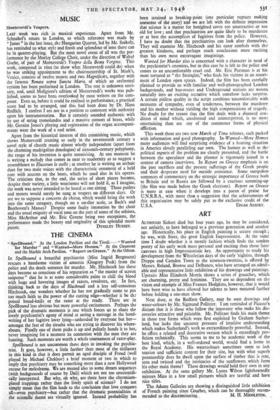THE CINEMA
"Spellbound." At the London Pavilion and the Tivoli. "Wanted for Murder" and "Wanted—More Homes." At the Gaumont and the Marble Arch Pavilion. "Report on Greece." At the Odeon.
IN Spellbound a beautiful psychiatrist (Miss Ingrid Bergmann) rescues a handsome victim of amnesia (Gregory Peck) from the police and the death sentence for murder. Mr. Hitchcock has these days become so conscious of his reputation as "the master of screen suspense" that he is at some considerable pains to chill the blood with huge and hovering images of razors, revolvers, etc. In fact, thinking back to the days of Blackmail and a less self-conscious Hitchcock, one wonders whether he has not gradually come to pin too much faith to the power of the cutting edge—whether it be the poised bread-knife or the razor at the ready. There are in Spellbound less obvious but more powerful excitements. Perhaps the pick of the dramatic moments is one which forces us to share the lovely psychiatrist's agony of mind at seeing a message in the hand- writing of her fugitive lover lying—unheeded by everyone but her— amongst the feet of the sleuths who are trying to discover his where- abouts. Finally one of them picks it up and politely hands it to her, riever imagining for a moment its connexion with the man they are hunting. Such moments are worth a whole tournament of razor-play.
Spellbound is not uncommon these days in invoking the psychia- trist. It goes, however, a little further than most of the titillators in this kind in that it does permit an aged disciple of Freud (well played by Michael Chekhov) a brief moment or two in which to imply that psychiatry may be something more than a new Hollywood excuse for melodrama. We are treated also to some dream sequences (with backgrounds of course by Dali) which are not too unscientifi- cally interpreted. But why, oh why, are there here the chromium- plated trappings rather than the lively spirit of science? I do not simply mean that the film leads to the conclusion that love conquers all—even psychiatry-,-but rather that the dramatic potentialities ot the scientific theme are virtually ignored. Instead probability has
been strained to breaking-point (one particular rupture making nonsense of the story) and we are left with the definite impression that science is a matter for benighted coves too unattractive or too old for love ; and that psychiatrists are quite likely to be murderers or at best the accomplices of fugitives from the police. However, I have no doubt that the psychiatrists can look after themselves. They will examine Mr. Hitchcock and his razor symbols with the greatest kindness, and perhaps reach conclusions more exciting than his own most extravagant imaginings.
Wanted for Murder also is concerned with a character in need of the psycbiatrist's attention, but in this case he is left to the police and comes to an uncomfortably cruel end. Mr. Eric Portman is at his most tortured as "the Strangler," who finds his victims in an assort- ment of London open spaces. Indeed, the film has been carefully planned to provide us with familiar and well-photographed London backgrounds, and bus-routes and Underground stations are woven. naturally into an exciting narrative which somehow lacks surprise. A certain pitiless quality in the script combines uncomfortably with moments of sympathy, even of tenderness, between the murderer and his mother without yielding the high compensations of tragedy. No doubt for the reason that the film deals with a diseased con- dition of mind which, unadorned and uninterpreted, is no more entertaining than are any of the commoner forms of physical affliction.
This week there are two new March of Time releases, each packed with information and good photography. In 'Wanted—More Homes many audiences will find surprising evidence of a housing situation in America closely paralleling our own. The human as well as the political aspects of the problem are clearly presented, and the battle between the speculator and the planner is vigorously joined in a contest of camera interviews. In Report an Greece emphasis is on the past sacrifices and the present sufferings of the Greek people and their desperate need for outside assistance. Some outspoken sentences of commentairy on the strategic importance of Greece both to Britain and to Russia are followed by a cautious summing-up (the film was made before the Greek elections). Report on Greece is more at ease when it develops into a paean of praise for U.N.R.R.A., with more than a suggestion that the achievements of this organisation may be safely put to the exclusive credit of the


























 Previous page
Previous page